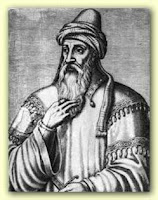Salah al-Din Yusuf ibn Ayyub
 Saladin (1138-1193) was born into a prominent Kurdish family, and it is said that on the night of his birth, his father, Najm ad-Din Ayyub, gathered his family and moved to Aleppo. There, his father entering the service of 'Imad ad-Din Zangi ibn Aq Sonqur, the powerful Turkish governor in northern Syria. Growing up in Ba'lbek and Damascus, Saladin was apparently an undistinguished youth, with a greater taste for religious studies than military training. There appears to have been few if any depictions of Saladin, but apparently tradition holds that he was a short man with a neat beard and even somewhat frail.
Saladin (1138-1193) was born into a prominent Kurdish family, and it is said that on the night of his birth, his father, Najm ad-Din Ayyub, gathered his family and moved to Aleppo. There, his father entering the service of 'Imad ad-Din Zangi ibn Aq Sonqur, the powerful Turkish governor in northern Syria. Growing up in Ba'lbek and Damascus, Saladin was apparently an undistinguished youth, with a greater taste for religious studies than military training. There appears to have been few if any depictions of Saladin, but apparently tradition holds that he was a short man with a neat beard and even somewhat frail.His formal career began when he joined the staff of his uncle Asad ad-Din Shirkuh, an important military commander under Nur al-Din. Nur al-Din, the ruler of Damascus and Aleppo, succeeded his father, Zengi, after that ruler's death, engaged in a race with the crusader Kingdom of Jerusalem to take over Egypt. During three military expeditions led by Shirkuh into Egypt to prevent its falling to the Latin-Christian (Frankish) rulers of the states established by the First Crusade, a complex, three-way struggle developed between Amalric I, the Latin king of Jerusalem, Shawar, the powerful vizier of the Egyptian Fatimid caliph, and Shirkuh.
In the last of these military expeditions, together with his uncle, Saladin approached the walls of Cairo on January 2, 1169 at which point the Franks, who had the city of Cairo under siege, retreated. Six days later, after allowing the Franks to evacuate unopposed, his troops reached the walls themselves. Thereafter, Saladin lured the rather untrustworthy Shawar into an ambush on January 18th, killing him. His uncle, Shirkuh then became vizier. However, he also died unexpectedly on the 23rd of March.
Subsequently, Saladin became vizier to the last Fatimid caliph (who died in 1171), earning him the title al-Malik al-Nasir ('the prince defender'), and therefore his relations and successors were all given this title. It took Saladin, or more properly, Salah al-Din Yusuf Ibn Ayyub (meaning Righteousness of Faith, Joseph, Son of Job), only a few more years to became the sole master of Cairo and the first Ayyubid sultan of Egypt in 1174. The Fatimid caliph's death on September 12th of 1171 left the reins of power in Saladin's hands, under the suzerainty of Nur al-Din. The situation could not have lasted indefinitely, but the death of Nur al-Din on May 15, 1174 allowed Saladin, as the sole ruler of Egypt, to assert his right to the throne. Saladin soon moved out of Egypt and occupied Damascus and other Syrian towns, though Egypt continued to be a base of his operations. Read more>>>> Tour Egypt
More on Salah Al Din Al Ayyubi: Fordham.edu, Wikipedia, Hyperhistory, Templar, Infoplease, Biography, Bookrags, Looklex Encyclopedia, Biographybase, Books, Scholar


